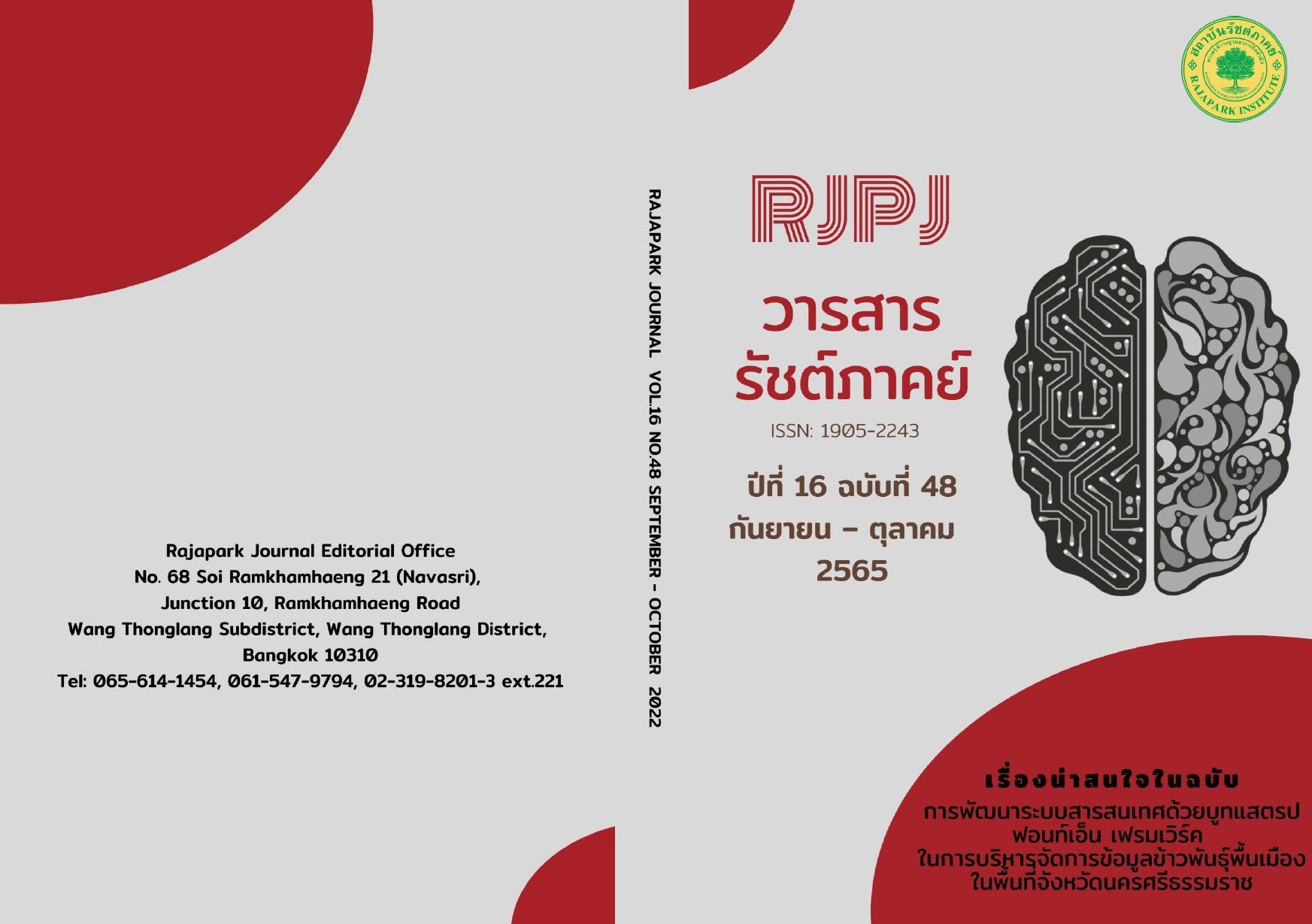การพยากรณ์ผลตอบแทนในอนาคตจากผลตอบแทนในอดีต: การศึกษาเชิงประจักษ์กองทุนรวมตราสารทุนในประเทศไทย
Main Article Content
บทคัดย่อ
บทความวิจัยนี้มีวัตถุประสงค์เพื่อศึกษาว่าผลการดำเนินงานในอดีตของกองทุนรวมตราสารทุนในประเทศไทยใช้การวิเคราะห์เชิงคุณภาพโดยการสำรวจเอกสารและงานวิจัยที่เกี่ยวข้องและการทดสอบแบบไม่ใช้พารามิเตอร์รวมทั้งการวิเคราะห์การถดถอย แบบจำลองการทดสอบผู้ชนะ-ผู้แพ้ ถูกใช้ในการวิเคราะห์ความคงอยู่ของผลการดำเนินงานของกองทุนรวมตราสารทุนในประเทศไทยโดยจะนำค่าอัตราผลตอบแทนรายเดือนและอัตราผลตอบแทนรายปีในแต่ละช่วงเวลามาประเมินผู้ชนะ (W) และผู้แพ้ (L) โดยจะกำหนดให้ผู้ชนะ (ผู้แพ้) ในช่วงเวลาหนึ่งคือกองทุนรวมตราสารทุนที่มีอัตราผลตอบแทนสูงกว่าหรือเท่ากับ (ต่ำกว่า) ค่ามัธยฐานของอัตราผลตอบแทนของกองทุนรวมตราสารทุนในประเทศไทยในช่วงเวลาดังกล่าว ผลการวิเคราะห์ข้อมูลโดยไม่ใช้พารามิเตอร์และผลการวิเคราะห์การถดถอยสะท้อนถึงความคงอยู่ของอัตราผลตอบแทนรายเดือนของกองทุนรวมตราสารทุนในประเทศไทยในช่วงเวลาที่ทำการศึกษา ตั้งแต่เดือนมกราคม พ.ศ. 2553 ถึง เดือนธันวาคม พ.ศ. 2564 ในขณะที่ผลการวิเคราะห์ข้อมูลโดยไม่ใช้พารามิเตอร์ของอัตราผลตอบแทนรายปี พบว่าไม่มีความคงอยู่ของอัตราผลตอบแทนรายปีของกองทุนรวมตราสารทุนในประเทศไทยในช่วงเวลาที่ทำการศึกษา ตั้งแต่ปี พ.ศ. 2553 ถึง ปี พ.ศ. 2564 โดยเฉพาะอย่างยิ่งในช่วงปี พ.ศ. 2563 ต่อเนื่องถึง ปี พ.ศ. 2564 อย่างไรก็ตามผลการวิเคราะห์การถดถอยของอัตราผลตอบแทนรายปี พบว่ามีความคงอยู่ของอัตราผลตอบแทนรายปีในเชิงลบของกองทุนรวมตราสารทุนในประเทศไทยในช่วงเวลาที่ทำการศึกษา ตั้งแต่ปี พ.ศ. 2553 ถึง ปี พ.ศ. 2564
Article Details

อนุญาตภายใต้เงื่อนไข Creative Commons Attribution-NonCommercial-NoDerivatives 4.0 International License.
ทัศนะและความคิดเห็นที่ปรากฏในวารสาร ถือเป็นความรับผิดชอบของผู้เขียนบทความนั้น และไม่ถือเป็นทัศนะและความรับผิดชอบของกองบรรณาธิการ
เอกสารอ้างอิง
Allen, D.E., & Tan, M.L. (1999). A Test of the Persistence of the Performance of U.K. Managed Funds. The Journal of Business Finance & Accounting, 26(5), 559-593. https://doi.org/10.1111/1468-5957.00267
Bilson, C., Frino, A., & Heaney, R. (2005). Australian Retail Fund Performance Persistence. Accounting and Finance, 45(1), 25-42. DOI: 10.1111/j.1467-629x.2004.00121.x
Brown, S.J., Goetzmann, W., Ibbotson, R.G., & Ross, S.A. (1992). Survivorship Bias in Performance Studies. The Review of Financial Studies, 5(4), 553-580. https://doi.org/10.1093/rfs/5.4.553
Brown, S.J., & Goetzmann, W.N. (1995) Performance persistence. The Journal of Finance, 50(2), 679-698. https://doi.org/10.1111/j.1540-6261.1995.tb04800.x
Carhart, M.M. (1997). On Persistence in Mutual Fund Performance. Journal of Finance, 52(1), 57-82. https://doi.org/10.1111/j.1540-6261.1997.tb03808.x
Chen, C. R., Lee, C. F., Rahman, S., & Chan, A. (1992). A Cross-Sectional Analysis of Mutual Funds Market Timing and Security Selection Skills. Journal of Business Finance and Accounting, 19(5), 659-675. https://doi.org/10.1111/j.1468-5957.1992.tb00650.x
Chen, H-L., Jegadeesh, N., & Wermers, R. (2000). The Value of Active Mutual Fund Management: An Examination of the Stockholdings and Trades of Fund Managers. The Journal of Financial and Quantitative Analysis, 35(3), 343-368. https://doi.org/10.2307/2676208
Christensen, P.H. (2005). Facilitating Knowledge Sharing: A Conceptual Framework. SSRN Electronic Journal, DOI: 10.2139/ssrn.982071
Cortez, M.D.C.R., Paxson, D.A., & Armada, M.J.D.R. (1999). Persistence in Portuguese Mutual Fund Performance. The European Journal of Finance, 5(4), 342-365. https://doi.org/10.1080/135184799337000
Deb, S.G., Banerjee, A., & Chakrabarti, B.B. (2008). Persistence in Performance of Indian Equity Mutual Funds: An Empirical Investigation. IIMB Management Review, 20(2), 172-187.
Dowen, R.J., & Mann, T.L. (2004). Mutual Fund Performance, Management Behaviour, and Investor Costs. Financial Services Review, 13(1), 79-91.
Droms, W.G., & Walker, D.A. (1994). Investment Performance of International Mutual Funds. The Journal of Financial Research, 17(1), 1-14. DOI: 10.1111/j.1475-6803.1994.tb00170.x
Droms, W.G., & Walker, D.A. (1995). Determinants of Variation in Mutual Fund Returns. Applied Financial Economics, 5(6), 383-389. https://doi.org/10.1080/758538597
Elton, E.J, Gruber, M.J., & Blake, C.R. (1996). The Persistence of Risk-Adjusted Mutual Fund Performance. Journal of Business, 69(2), 133-157. https://www.jstor.org/stable/2353461
Goel, S., & Mani, M. (2016). Prediction of Future Performance of Mutual Funds on the Basis of Past Performance. International Journal of Advances in Management and Economics, 5(3), 32-40.
Goetzmann, W.N., & Ibbotson, R.G. (1994). Do Winners Repeat?. The Journal of Portfolio Management Winter, 20(2) 9-18. DOI: https://doi.org/10.3905/jpm.1994.9
Grinblatt, M., & Titman, S. (1989). Portfolio Performance Evaluation: Old Issues and New Insights. The Review of Financial Studies, 2(3), 393-421. https://www.jstor.org/stable/2962166
Grinblatt, M., & Titman, S. (1992). The Persistence of Mutual Fund Performance. The Journal of Finance, 47(5), 1977-1984. https://doi.org/10.1111/j.1540-6261.1992.tb04692.x
Grinblatt, M., & Titman, S. (1993). Performance Measurement Without Benchmarks: An Examination of Mutual Fund Returns. The Journal of Business, 66(1), 47-68. http://www.jstor.org/stable/2353341
Ippolito, R.A. (1989). Efficiency with Costly Information: A Study of Mutual Fund Performance, 1965-1984. The Quarterly Journal of Economics, 104(1), 1-23.
Jan, Y.C., & Hung, M.W. (2003). Mutual Fund Attributes and Performance. Financial Services Review, 12, 165-178.
Kaur, A. (2011). Persistence in Performance of Equity Mutual Funds in India-an Empirical Investigation. International Journal of Management and Computing Sciences, 1(3).
Khan, R.N., & Rudd, A. (1995) Does Historical Performance Predict Future Performance?. Financial Analysts Journal, 51, 43-52.
Malkiel, B.G. (1995). Returns from Investing in Equity Mutual Funds 1971 to 1991. The Journal of Finance, 50(2). 549-572. https://doi.org/10.1111/j.1540-6261.1995.tb04795.x
Malhotra, D.K., & Mcleod, R.W. (1997). An Empirical Analysis of Mutual Fund Expenses. The Journal of Financial Research, 20(2), 175-190. https://doi.org/10.1111/j.1475-6803.1997.tb00243.x
Sharpe, W.F. (1966). Mutual Fund Performance. The Journal of Business, 39(2), 119-138.


